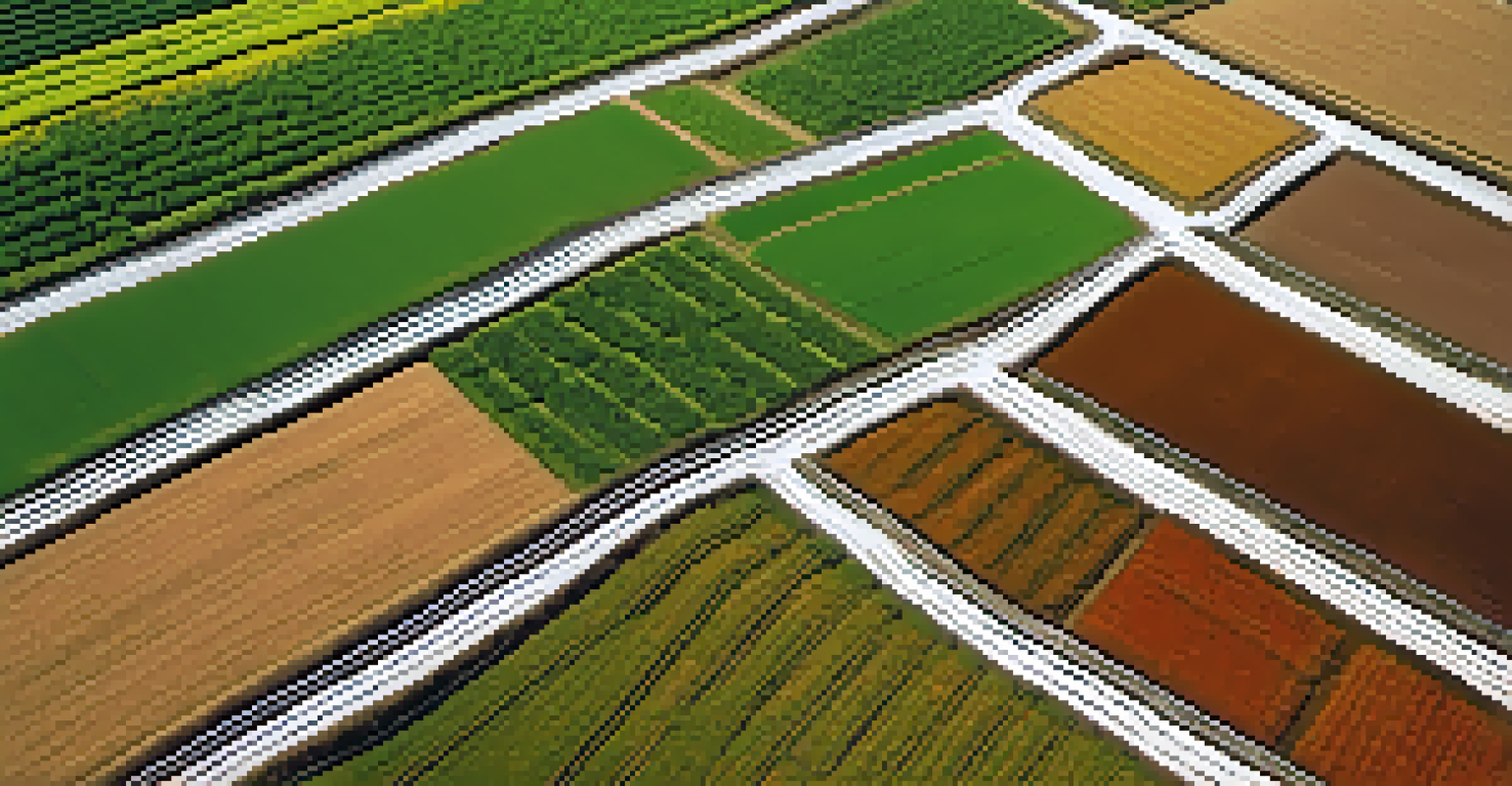Impact of Soil Health on Raw Food Sustainability and Nutrition

Understanding Soil Health and Its Importance
Soil health refers to the condition of soil in terms of its capacity to function effectively as a living ecosystem. Healthy soil is vital for growing nutritious food, supporting biodiversity, and regulating water systems. It acts as a foundation for food production, influencing everything from plant growth to the nutritional quality of the food we consume.
The health of our soil is the foundation of our food system, and it’s vital to make this a priority for the future of farming.
A well-balanced soil is teeming with life, including bacteria, fungi, and other microorganisms that work together to break down organic matter. This process not only enriches the soil but also ensures that plants can absorb essential nutrients needed for growth. When soil health deteriorates, these vital processes are disrupted, leading to poorer food quality and sustainability.
In essence, soil health is the backbone of our food systems. Without it, we risk compromising the quality and availability of the raw foods that nourish our bodies. As we explore the connection between soil health and nutrition, it becomes clear that sustaining our soils is crucial for a healthy future.
The Link Between Soil Nutrients and Food Quality
Nutrients in the soil directly influence the nutritional content of crops. For example, plants that grow in nutrient-rich soil are more likely to be packed with vitamins and minerals, whereas those in depleted soil may lack essential nutrients. This disparity can lead to significant differences in the health benefits of our raw food choices.

When soil is healthy, it supports a diverse ecosystem of microorganisms that help plants absorb nutrients more effectively. This means that fruits, vegetables, and grains grown in such environments tend to be more flavorful and nutritious. Conversely, crops grown in poor soil often exhibit deficiencies that can impact human health when consumed over time.
Soil Health Drives Food Quality
Healthy soil is essential for producing nutritious crops, directly impacting the vitamins and minerals available in our food.
For instance, a study showed that carrots grown in nutrient-dense soil had higher levels of beta-carotene compared to those grown in depleted soil. This example highlights the importance of soil management practices that enhance nutrient availability, ultimately leading to better raw food options for consumers.
How Soil Health Affects Sustainable Agriculture
Sustainable agriculture focuses on producing food in a way that maintains the health of the environment, and soil health is at its core. Practices such as crop rotation, cover cropping, and reduced tillage help to maintain soil structure and fertility, reducing the need for chemical fertilizers. This, in turn, supports the production of healthier raw foods.
Healthy soil is the key to a healthy community, providing nourishment for our bodies and for the planet.
Healthy soil can also store carbon, which plays a critical role in mitigating climate change. By improving soil health, farmers can not only enhance crop yields but also contribute to environmental sustainability. This dual benefit reinforces the idea that investing in soil health is an investment in the future of food production.
Additionally, sustainable farming practices promote biodiversity, which can lead to more resilient food systems. By fostering healthy soils, farmers can produce a variety of crops that are less susceptible to pests and diseases, ensuring a steady supply of nutritious raw foods.
The Role of Organic Matter in Soil Health
Organic matter, such as decomposed plant and animal material, plays a significant role in maintaining soil health. It improves soil structure, enhances water retention, and provides a habitat for beneficial microorganisms. The presence of organic matter is a key indicator of soil fertility and its potential to support healthy crops.
When organic matter is abundant, it acts like a sponge, holding onto moisture and nutrients that plants need to thrive. This is particularly important in times of drought or extreme weather conditions, as healthy soil can help ensure consistent food production. Thus, the relationship between organic matter and soil health is crucial for sustaining raw food supplies.
Sustainable Practices Enhance Soil
Implementing sustainable agricultural practices helps maintain soil health, leading to better food production and environmental resilience.
Moreover, incorporating organic practices into farming, such as composting and using green manures, can significantly boost the organic matter content of the soil. This not only enhances soil health but also contributes to better yields of nutrient-rich raw foods.
Impact of Soil Contamination on Nutrition
Soil contamination from pollutants can severely impact the quality of food produced. Heavy metals, pesticides, and other harmful substances can accumulate in the soil and subsequently enter the food chain, posing health risks to consumers. This highlights the importance of monitoring soil health to ensure the safety of our raw food sources.
Contaminated soil can lead to reduced biodiversity, affecting the microorganisms that play a vital role in nutrient cycling. When these beneficial organisms are compromised, the ability of plants to absorb nutrients decreases, ultimately affecting the nutritional value of crops. This creates a cycle of poor health for both the soil and the food it produces.
Addressing soil contamination requires concerted efforts from farmers, policymakers, and communities. Implementing sustainable practices and regulations can help mitigate contamination, ensuring that our raw food remains safe and nutritious.
The Future of Soil Health and Raw Food Production
As we look to the future, the importance of soil health in raw food production cannot be overstated. With increasing global populations and changing climate conditions, we must prioritize practices that enhance soil health and, by extension, food sustainability. Innovative approaches, such as regenerative agriculture, are gaining traction and focus on restoring soil health to create a more resilient food system.
Investing in soil health research and education is essential for empowering farmers to adopt sustainable practices. By understanding the complex interplay between soil, plants, and nutrition, we can foster a food system that meets the needs of current and future generations. This holistic approach can lead to improved food quality and sustainability.
Community Efforts Promote Soil Health
Local initiatives and support for sustainable farming can strengthen soil health awareness and ensure access to nutritious foods.
Ultimately, the health of our soils is directly linked to the quality of the food we eat. By promoting healthy soils, we are not only supporting our nutritional needs but also safeguarding the planet for years to come.
Community Actions for Soil Health and Nutrition
Communities play a vital role in promoting soil health and ensuring sustainable nutrition. Local gardening initiatives, such as community gardens and urban farms, can help educate individuals about the importance of soil management and its impact on food quality. These grassroots efforts can foster a connection between people and the land, encouraging healthier food choices.
Moreover, community-supported agriculture (CSA) programs allow consumers to directly support local farmers who prioritize soil health. By purchasing seasonal produce from these farmers, consumers can enjoy fresh, nutrient-rich raw foods while contributing to sustainable practices that benefit the environment.

Lastly, advocating for policies that support sustainable agriculture at the local and national levels can amplify these efforts. By coming together, communities can create a powerful movement that prioritizes soil health, ensuring that everyone has access to nutritious raw foods.